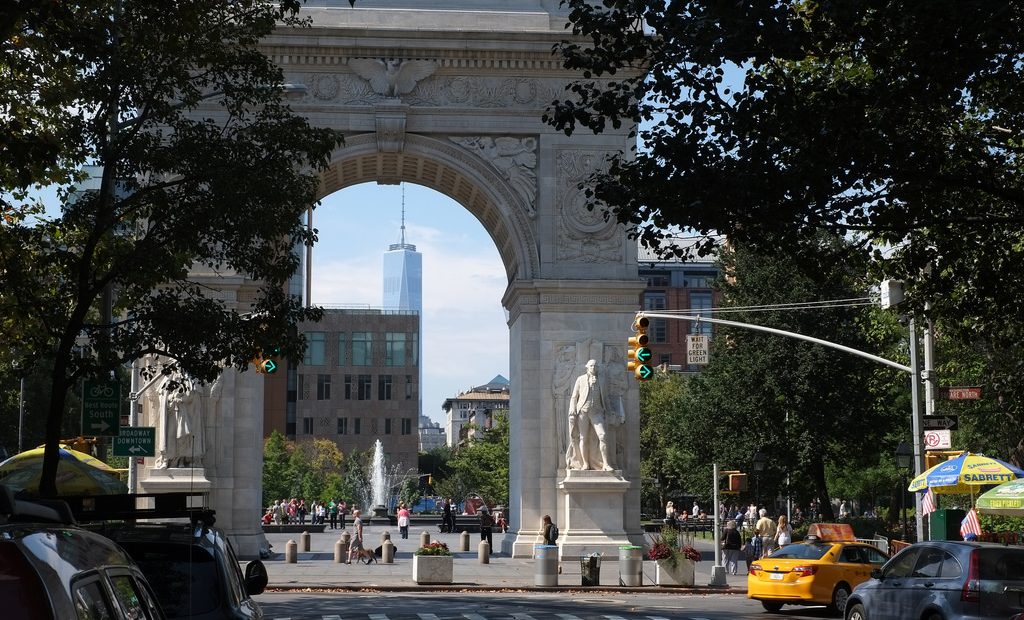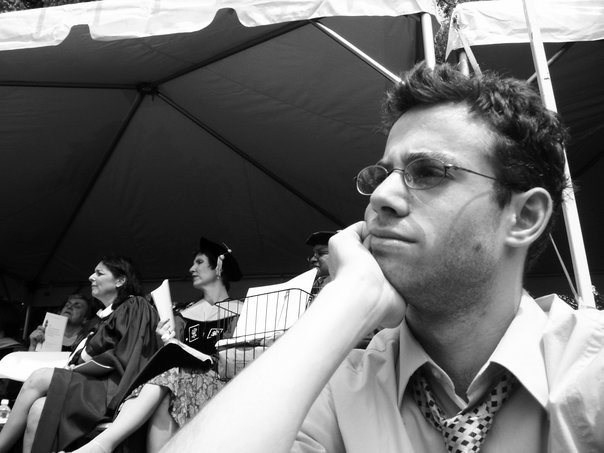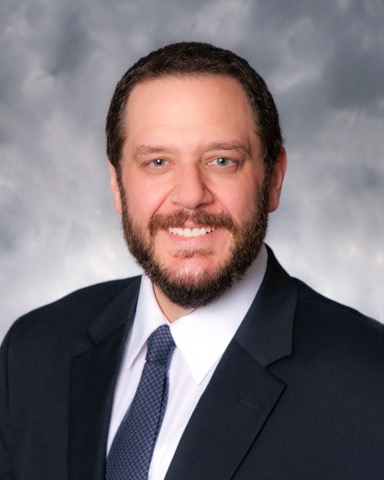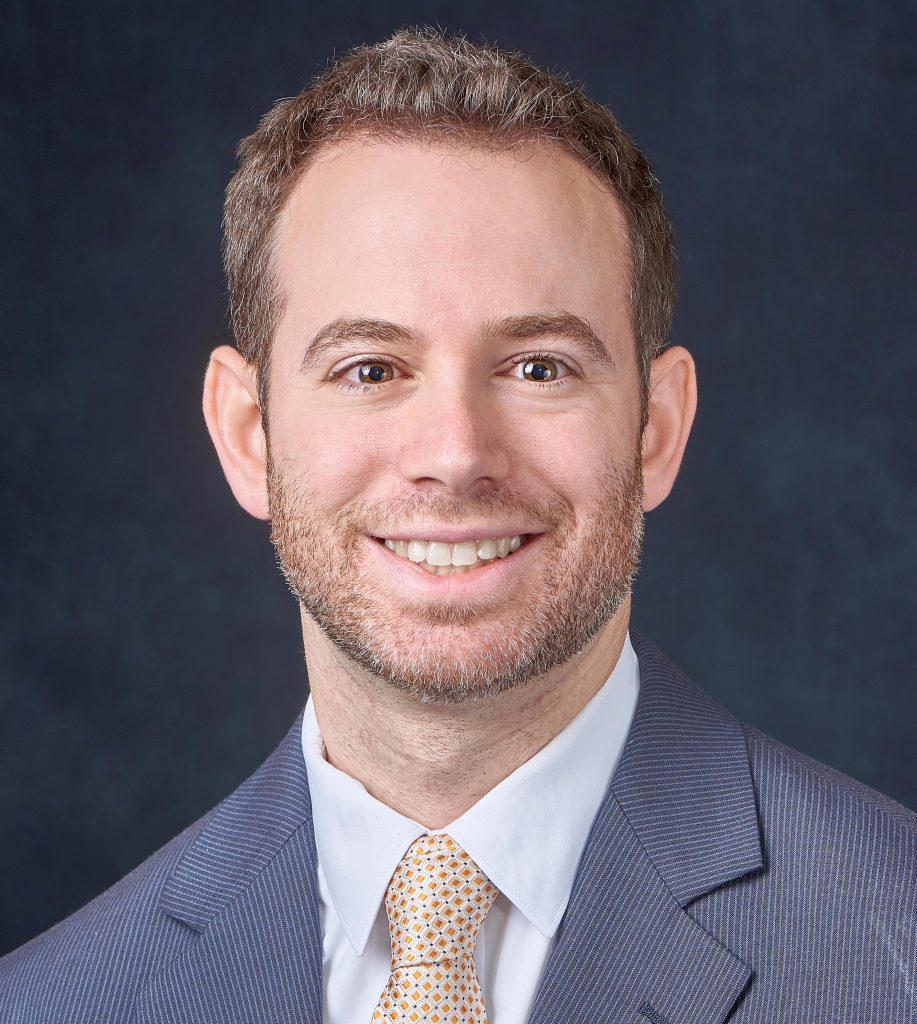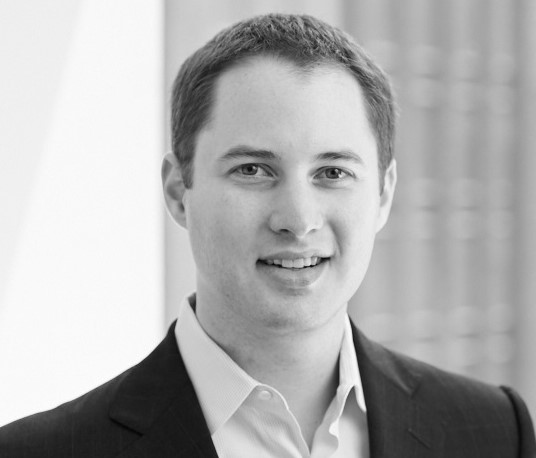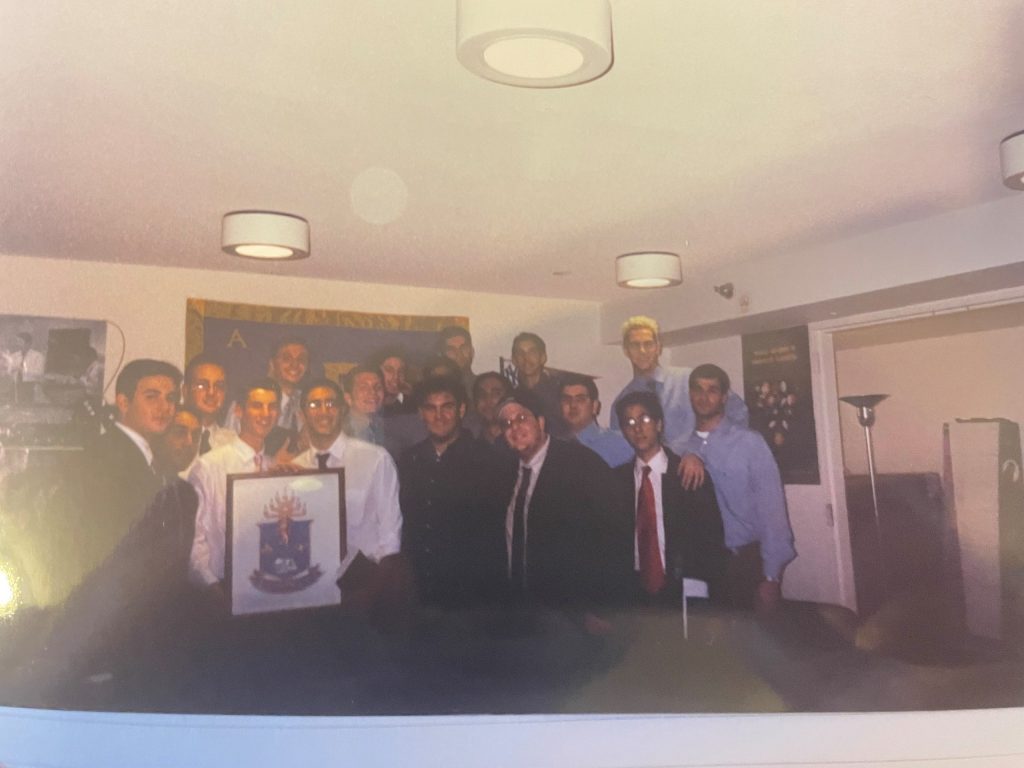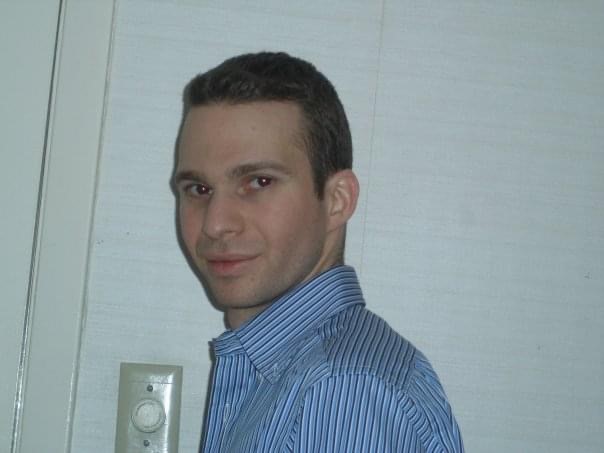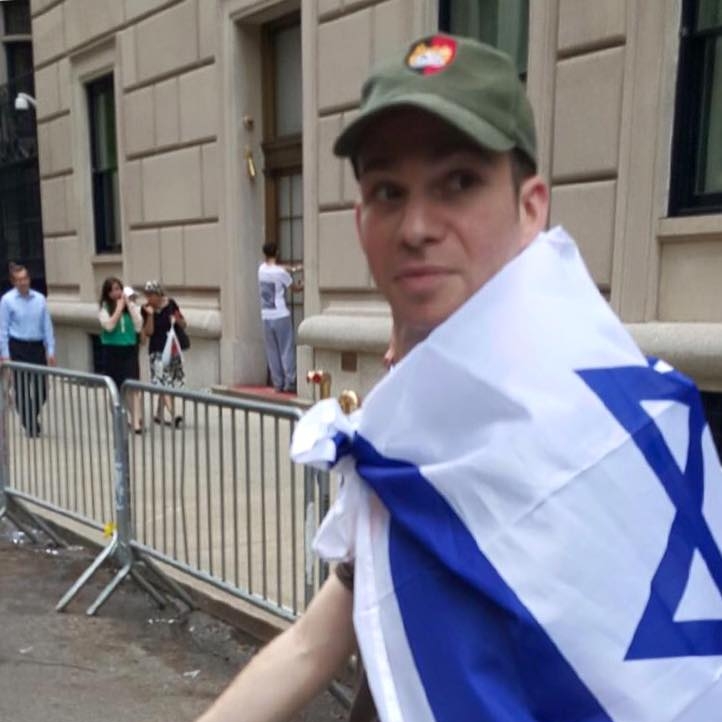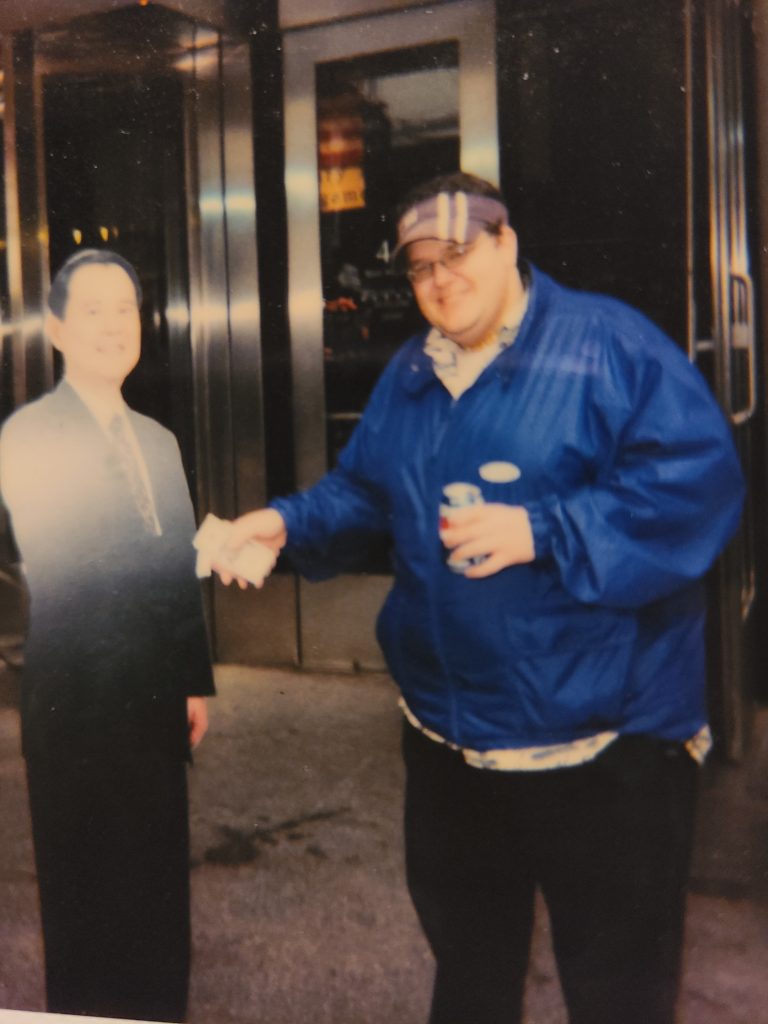This week’s Friday PiDay is going to be a little different than the more than 250 other features we have presented in this space. This week, to honor the memory of the attacks on the World Trade Center twenty years ago tomorrow, we have asked four Brothers who were undergraduates in our Alpha chapter and students at New York University in 2001 for their memories and stories about how the attacks influenced them.
When Brothers Jesse Holzer (NYU, 2004), David Rosenberg (NYU, 2003), Doug Bunim (NYU, 2005) and Brian Mermelshtein (NYU, 2002) get together to talk, two subjects invariably arise: September 11, 2001, and AEPi.
“We were in either our second or third night of rush,” said Brother Brian Mermelshtein. “I remember we had a Monday night football event – Doug (Brother Bunim) was rushing at the time — and after I walked some rushees back to their dorm, I was playing pool with Popper (Brother Rosenberg). I feel like I asked him if he was going to work tomorrow but nobody remembered the answer.”
David Rosenberg was working an internship with Morgan Stanley that semester on the 73rd floor of Tower Two of the World Trade Center.
“I had worked in the building full time during the summer and was going in part-time during the school year. I think it was the first Tuesday of the school year and I had an 8:00 a.m. Econ class followed by a Hebrew class. That’s why I wasn’t at work that day,” he said.
Brother Jesse Holzer recalled, “To put this into context, you have to realize that I was a sophomore in college in 2001 and had owned a cell phone for about eight or nine months. When everything happened it was absolute chaos and, with the cell towers down, it was hard to reach anybody to tell them what was happening or to find out anything. Our first thought was Popper and that he was on the hundred something floor at that time. No one realized that he had a class.”
Brother Mermelshtein added, “That morning I was doing my Hebrew homework – like I don’t know Hebrew…I was taking it for the grade – and another Brother came crashing into the room I was in and told us that a plane had hit the World Trade Center. We all crowded into his room to see what was going on. And, then, for some stupid reason, I went to class. I almost got run over twice and you could smell the smoke in the air. After class we went to Washington Square Park, and we congregated there and saw the second tower go down. A lot of us went over to the kosher cafeteria after that. I was next to Jesse and Doug – who was just rushing us — walked in and all of our thoughts were in the same place. ‘Where is Popper?’ No one knew where he was. Cell phones weren’t working at all.”
“Somehow,” Brother Mermelshtein continued, “I was able to get in touch with Andy Borans and Sid Dunn (ed. note: at the time Andy Borans was the Director of Chapter Services and Sid Dunn was the Executive Vice-President of Alpha Epsilon Pi International). You could phone out long distance, but you couldn’t call others in New York. I was able to get in touch with them and tell them that we were safe, and they were able to relay the news to others.”
“I guess I didn’t realize that not everyone knew that I was in class that morning,” said Brother Rosenberg. “I say that after the fact. It’s interesting that even being so close, I couldn’t hear anything. I remember walking out of that Hebrew class with some people and you could see smoke coming from down where the World Trade Center was. The news hadn’t hit me yet. I didn’t know what was going on. I was regrouping in front of Weinstein (an NYU building), and I ran into David Ash (another Alpha chapter Brother), and he said, ‘Hey Popper, people are looking for you. No one knew where you were.’ Since I still hadn’t heard what happened at the Towers, I thought that people were just wondering where I was since I had been in class. No one could reach me on my cell phone.”
Many hours later, when some cell service was restored, Brother Rosenberg was able to listen to a series of increasingly alarmed voice mails his mother had left for him because she also did not know that her son was in class. “I can only imagine what was going through my mother’s head while she was leaving me those messages,” said Rosenberg.
“I was a freshman that year and I think it was my first week of classes, said Brother Bunim. “I had gone to a few AEPi parties during orientation, but I wasn’t in the chapter yet.
I was in Stern (NYU’s School of Business) and lived in Weinstein where the kosher café was located. I was on my way to Stern and I was going downtown on University, and I looked up and saw all of the smoke coming from the first tower. I called my father and asked him what was going on. I told him that there was smoke coming from the first tower and he told me that it was pilot error and that’s what we thought: It was no big deal…pilot error in some small plane. I went to class, it was a 9:30 a.m. class in the sub-basement level so we had no idea what was going on. The Dean of Students came in after a while and said, ‘I just want everyone to know that we are monitoring things closely, but you need to know that the second tower has been hit, the pentagon has been hit and the country is under attack.’
The professor – he was horrible – told us that no one could leave, or he would fail us. To this day, I remember that. By the time I got upstairs after class, the towers had just collapsed. I think I walked back to my dorm and apparently my parents were trying to reach me. Luckily, my aunt and uncle lived in the East Village, and they walked to my dorm to check on me because the cell phones weren’t working.”
Brother Mermelshtein continued, “That first realization we had when we all got into the kosher café was ‘Where is Popper?’ and then all of a sudden out of no place, Popper walks in. We were all staring at him…we were so scared, and he just walks in.”
“Everyone was super worried about me,” said Rosenberg. “And, I didn’t even realize it. I ran into that one Brother outside and he told me that everyone was looking for me so I thought I should go inside and tell them where I was. It didn’t even hit me why they were so worried until I got there.”
Following the attacks, the chapter came together like never before in part because of the need to rely on each other and in part through a commitment to helping to ease the burden on others.
“Mike Halper and I were the ‘rush guys’ at the time,” said Brother Holzer. “We got like 17 guys that fall. That was in part due to hard work and obviously it was a testament to the individual guys, but I also think people were looking for a connection. As Doug pointed out, imagine that is your first week of school and this is your introduction to college. I think a lot of students were interested in joining a fraternity because they were looking to find a place to be, to belong.”
At the time, the Alpha chapter had a flat in an NYU dorm on 14th street, which was the top of the “safe area” of Manhattan. “We had tanks on our street for – what seems like – weeks. Below 14th street, you could smell the smoke. You wore masks,” said Holzer. “We started housing people in our space. Even if they weren’t Brothers. We had some sophomore Brothers who lived in a dorm on Water Street. They were not only really close to the attacks but the whole glass façade of their building shattered. We had guys camping out on our floor for a number of weeks. We were at a place – both physically and fraternally – that could be a haven for those who needed it.”
Brother Holzer added, “Parts of that day are very clear, and parts are still very fuzzy. I remember I went to a hospital in Murray Hill (Beth Israel), near NYU, and I went there to donate blood because I wanted to do something to help. By 11:00 that morning, there was a line around the building, and they told me to go home and come back in three weeks when the need for blood will be just as strong.
- Brother Cantor Holzer in college
- Brother David Rosenberg
- Brother Cantor Jesse Holzer
- Brother Doug Bunim
- The 2001 new member class at Alpha Chapter
- Brother Brian Mermelshtein in college
- Brother Brian Mermelshtein at a recent rally to support Israel.
- Brother David Rosenburg in college
“I was an EMT and wanted to go and help. The first weekend after the attacks, I went to Ground Zero with another friend of mine who was also an EMT,” said Rosenberg. “We spent most of our time helping fit the first responders with their face coverings. They were real heroes and if we could help in some small way to make it easier for them, we would do it.”
Brother Mermelshtein remembered, “It was a leadership moment for me – I was the Lieutenant Master and a senior at the time – and we needed to step up, especially the older guys, we needed to be strong. A couple of months later, we went down to Battery Park City in lower Manhattan, and we threw a little food festival for a synagogue there. We had all of the Brothers and we brought in Phil Cohen (ed. note: Past Supreme Master Phil Cohen, an Alpha alumnus from 1957). It really was the point where we all felt we had to step up and help to make the community stronger.”
“I lived south of 14th, and they came around and said that if you can go home, you should. I was originally from Long Island so I could leave. I think classes were canceled for a week and then Rosh Hashanah was the next week. That was my freshman year experience,” said Brother Bunim. “It was such a monumental event that shaped my first semester of college. It’s tough to know what would have happened to my life if 9-11 hadn’t happened. Obviously, it shaped a lot of who I was. It changed my relationships, and the classes I took. I think we all grew closer. I became very active in AEPi after 9-11. Brian was my big brother, and we became very close. We all needed that connection of fraternity.”
For Brother Holzer, 9-11 became the day that everything changed for him. “Later that day, parents were able to connect with me. A cousin of mine – a distant cousin – -was on Flight 93 that crashed in Shanksville. There were now so many other layers beyond just being in Manhattan, said Holzer. “I wanted to be a sports journalist when I was a sophomore at NYU and needless to say, today I am not a sports journalist. I’m a Cantor in Florida. 9-11 and the aftermath kind of shaped my journey to what I would find deeper meaning in and kind of what really mattered.”
“It took me a long time to visit Ground Zero after the attacks. I didn’t go for about 10 years. I just wasn’t able to go. One time that I went to the memorial, they had an exhibit on sports. The Yankees were playing the Diamondbacks in the world series that year. The exhibit reminded me that they said that sports would heal us, but I didn’t feel that sports could do that. I felt like the kinds of stuff we were doing in the community and other people were doing around NYU, those were the kinds of things that were impactful to me. I said I could still like sports but the people stuff that we were doing, this is the kind of thing I could see myself doing. I switched my major to Judaic studies, became Master of the Alpha chapter and then joined the Cantorate,” said Brother Holzer.
Brother Bunim agreed that his AEPi experience helped him overcome the many difficulties that NYU students had to face after the attacks. “NYU isn’t big on Greek life but realizing the interpersonal need that we all felt at that time, that helped fuel our AEPi experience. I’m thankful for everything the fraternity did for us at that time. The fraternity meant so much to us. I can’t begin to tell you how important it was for us to have Brotherhood at a time like this. Having that Brotherhood was really something special. Today, all of my NYU connections were AEPi Brothers.”
“That day was certainly a defining moment and something I will never forget but I don’t know if it changed me,” said Brother Rosenberg. “I have it with me, but you carry it with you, and you have to move on.”
Brother Holzer agreed, “We talk about this when I do grief counseling with families who have lost loved ones. We don’t move past tragedy, we kind of move through. You still have to navigate life and move on. We never move on past these kinds of events, but we move through. We carry it with us for the rest of our lives.”
“9-11 helped put into context what the important things are in life,” said Brother Mermelshtein. “I’ll go back to it. Popper and I are close…I’m close with all of these guys … the thought of Popper not being there anymore, when that night before we were playing pool and the next day he could have been gone. I call all of these guys every year on September 11 to talk about those days. Remembering it – keeping it alive in my head and for others – is so important. That experience helped me understand what’s important in life and what’s right. I think about it a lot.”
#ProudtobeaPi
On the twentieth anniversary of 9/11, we remember our Brothers and the other victims of the attack on the United States.
Gone too soon, but never forgotten. Remembering Brothers Frank Morton, Brett Freiman, Steven Goldstein, Joshua Rosenblum, Richard Ross and Andrew Zucker.
May their memory be a blessing. זכר צדיק לברכה
